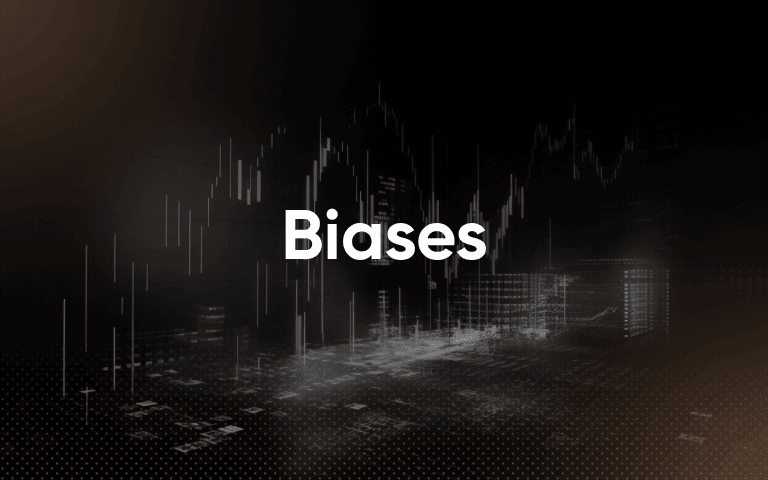A complete guide to trading biases

Biases in trading describe the psychological tendencies and irrational behaviours that can influence a trader's approach. These biases may lead to poor decisions that can have a significant impact on trading outcomes. Below, we’ll explore the most common trading biases, covering what they are and how they can negatively impact your strategies.
What is anchoring bias?
Anchoring bias is a cognitive bias that occurs when a trader relies too heavily on a single piece of information or past experience when making decisions. A simpler anchoring bias definition is that it is the tendency to use first impressions to form further perceptions.
Anchoring, also known as anchoring effect or focalism, is part of behavioural finance studies, which examines how emotions and other external factors impact economic choices.
Anchoring bias example
A trader buys CFDs on the UK 100 index. A trading session started off with a bullish run. The trader feels certain that the day would continue in an uptrend, as they were essentially anchored to the information about the ‘bullish run’ they received earlier that day. When the market shows clear signs of exhaustion, they still claim it is bullish.
What is confirmation bias?
Confirmation bias is a cognitive bias that affects the way we process information. It was first observed by the Greek philosopher Thucydides, but English psychologist Peter Wason coined the actual term in the 1960s.
Around that time, experimentation suggested that people are biased towards information that confirms their existing beliefs. Later on, research re-framed this phenomenon as a tendency to test hypotheses in a one-sided way, focusing on one outcome and ignoring others.
Confirmation bias example
A trader holds a long Tesla position. Despite emerging news on Tesla’s production challenges and increased competition, the trader chooses to focus instead on a bullish tweet from Elon Musk, based on one of his previous tweets influencing an uptick in price.
What is familiarity bias?
Familiarity bias can be explained as a cognitive bias that causes people to favour information or items that are familiar to them.
In trading, this may mean traders are more likely to make trading decisions based on their own experiences rather than objectively evaluating the situation. For example, a familiarity bias could be only trading shares of companies based in your home country, in sectors familiar to you or that are globally renowned.
Familiarity bias example
A UK trader’s share portfolio consists entirely of UK stocks, due to disproportionately high news exposure to those stocks. This potentially means the trader misses out on the benefit of diversifying across potentially more lucrative regions such as selected emerging markets.
What is herd bias?
Herd mentality bias is when people rationalise a course of action based on the fact that many other people are doing the same. In trading psychology, this could take the form of trading an asset simply because it is considered a hot commodity among other traders, possibly leading to asset bubbles.
Herding instincts could also lead to panic buying (or selling) after witnessing an increasing number of people doing so.
Herd bias comes from the idea that following the crowd will lead to desired outcomes as there is safety in numbers. But it’s more ingrained than that; noone consciously decides to follow the herd, it is simply hardwired into us.
Herd bias example
During the dotcom bubble of the late 1990s and early 2000s, many people frantically started investing in US internet-related technology companies, irrespective of these companies’ fundamentals. As a result, the prices of tech stocks spiked dramatically and then later crashed.
What is hindsight bias?
Hindsight bias is a tendency to look back at an event that could not have been predicted and thinking the outcome was easily predictable. It’s also known as the ‘knew-it-all-along’ effect, or ‘creeping determinism’. It happens in all sorts of situations, from sporting events to elections, to weather, and it can have an effect on trading psychology.
Trading involves making a lot of predictions, about the direction of a market, which assets to invest in, which derivatives to trade, etc. A trader will almost certainly make hundreds of decisions in a short space of time. If just a handful of them end up being accurate it is possible that the hindsight effect will lead to our hypothetical trader to think they have a kind of Midas touch when, in truth, they might have a fairly low hit rate.
Hindsight bias example
An inexperienced trader ends up making money in their first few trades. It might be that they had some good information, or some good luck, or they were genuinely shrewd. However, the trader does understand why the market moved in the way it did.
Whatever the real reason for their early success, they think that their good fortune was inevitable, which leads to them taking unnecessary risks which, in turn, means that they could start to lose money.
What is negativity bias?
A simple negativity bias definition is a cognitive bias that occurs when a trader remembers and over-focuses on negative trading outcomes, allowing their emotions – such as fear and anxiety – to dictate their future decision-making.
Negativity bias is part of behavioural finance studies, which examines how emotions and other external factors impact economic choices.
Negativity bias example
In the past, a trader opened a long CFD position on Apple. Due to a number of factors, they experienced a loss. As a result, they become overly fixated on the loss incurred, leading them to make decisions based on fear and irrational assumptions rather than market trends and analysis. As such, even once the market conditions improve, the trader refuses to trade again.
What is overconfidence bias?
Overconfidence bias is the tendency to overestimate one’s own abilities and knowledge, leading to overconfidence in decision-making. The overconfidence bias in finance could be detrimental for traders, as it could cause them to make mistakes which, in turn, could lead to them making losses.
Overconfidence bias example
An example of overconfidence bias in trading is when a trader believes an asset will continue to move in a way that benefits them, despite receiving negative news or signals.
Let’s say a trader once made a profit when going long on Amazon CFDs. They now feel confident the price will likely continue rising, leading them to hold onto the position for too long, meaning that when its price trajectory changes they incur significant losses.
What is recency bias?
A recency bias is when you only focus on recent asset performance, or the most recent outcomes, be they successful or not. In other words, this bias is a trader’s tendency to consider the most recent price movements, news or information and ignore or fail to take into account what came before in the past.
Recency bias example
An inexperienced trader decides to start trading shares. After doing some research, they identify three companies they’d like to start trading. Looking at the data of these companies over the last 10 years, their average annual returns were 20%, 30% and 50% respectively.
An intuitive choice could be the company with 50% return over the past decade. However, the trader decides to avoid this company as they learn that one of the group's investors had recently put money into a firm that ended up going into bankruptcy.
Even though there was no connection between the bankrupt company and the firm with the 50% return, a negative connection was created in the trader’s mind and influenced their decision.
What is self-attribution bias?
Self-attribution bias, also known as self-serving bias, is a cognitive bias in trading that occurs when a person attributes positive outcomes to their own skills, but blames factors outside their control, such as bad luck, for losses.
Self-attribution bias in trading may lead to overconfidence and excessive risk taking, as traders may overestimate their own abilities when on a winning streak, and vice versa, they may fail to acknowledge their own mistakes when losing.
Self-attribution bias example
Some examples of self-attribution bias in trading include taking excessive credit for wins, blaming external factors for losses, behaving overly confidently, ignoring past mistakes. The bias can lead to unreasonable risk-taking, failure to learn, hindsight, confirmation bias, inaccurate self-assessment, overemphasis on short-term results.
What is survivorship bias?
In finance, survivorship bias is the tendency to view stocks that have ‘survived’ as an accurate representation of overall performance, while disregarding those stocks that have failed or been removed from the market due to poor performance or other factors. This can lead to traders making misguided decisions.
Survivorship bias example
In 2020, trader and software developer Michael Harris tested and wrote about the effect of survivorship bias on cross-sectional momentum on the Price Action Lab Blog.
He tested a trend-following strategy on two sets of historical stock data: one that included delisted stocks and one that didn’t. Since delisted stocks often performed poorly before their removal, the sample excluding them showed better results – introducing survivorship bias and making the strategy appear more successful than it actually was. This led Harris to conclude:
‘Not taking into account survivorship bias can lead to highly misleading results. In many cases, when survivorship and other sources of bias are added together, the actual results are random.’
What is loss aversion bias?
Loss aversion is a cognitive bias that refers to the tendency of individuals to experience greater negative emotions and psychological distress when they lose something, as compared to the positive emotions they feel when they gain something. In trading, a simple loss aversion bias definition is that it is the tendency to focus on avoiding losses rather than attempting to acquire equivalent gains.
Loss aversion bias example
A trader holds a long position on Meta CFDs. The stock starts to fall. Driven by loss aversion, the trader becomes overly attached to a losing position. Even though the market shows clear signs of the start of a prolonged bearish trend, they refuse to cut losses by closing their position and decide to keep it open until the position recovers. The stock, however, continues to fall, and the trader experiences even larger losses. Such a behaviour is often referred to as the ‘sunk cost fallacy’.
How to minimise biases in trading
Whatever the bias, you can take measures to minimise their effects. Keep the following actions in mind to trade more objectively, with less emotion and fewer misleading data points.
-
Seek diverse information: look for a range of information sources, rather than relying solely on a particular data point or news headline. This could help provide a more complete and accurate picture of the trade’s potential. Find out more about the markets and how to approach trading them with our market guides.
-
Implement trading rules: set strict trading rules that could help avoid making impulsive or irrational decisions. For example, you could establish a maximum percentage of your portfolio to allocate to a single asset.
-
Diversify your portfolio: diversify your portfolio across multiple assets or instruments as it could potentially help avoid becoming too attached to a particular position.
-
Keep your emotions in check: maintain self-discipline. Trading can be a highly emotional activity, especially when sudden market news results in high volatility.
-
Use a systematic approach: implement a systematic approach to trading as a way to reduce the impact of emotional biases in general. The approach could involve developing a clear set of trading criteria and sticking to them, rather than relying on intuition or subjective judgments.
-
Keep a trading diary: a trading diary or journal could help you keep track of your decision-making process, as well as wins and losses to identify performance mistakes and analyse whether anchoring bias has been at play.
Even if your trading is as free from bias as possible, you’ll still need a solid strategy in place. Learn more about trading strategies here. Not ready for the live markets? Practise risk-free with a demo account.
Want to learn more about trading psychology?
Take a look at some of our other comprehensive psychology guides.

Effects in trading

Sentiment in trading
